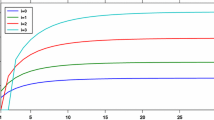Abstract
This paper attempts to study two-person nonzero-sum games for denumerable continuous-time Markov chains determined by transition rates, with an expected average criterion. The transition rates are allowed to be unbounded, and the payoff functions may be unbounded from above and from below. We give suitable conditions under which the existence of a Nash equilibrium is ensured. More precisely, using the socalled “vanishing discount” approach, a Nash equilibrium for the average criterion is obtained as a limit point of a sequence of equilibrium strategies for the discounted criterion as the discount factors tend to zero. Our results are illustrated with a birth-and-death game.
Similar content being viewed by others
References
Anderson W J. Continuous-Time Markov Chains. New York: Springer-Verlag, 1991
Altman E, Avrachenkov K, Bonneau N, et al. Constrained cost-coupled stochastic games with independent state processes. Oper Res Lett, 2008, 36: 160–164
Federgruen A. On N-person stochastic games with denumerable state space. Adv Appl Probab, 1978, 10: 452–471
Guo X P, Hernández-Lerma O. Drift and monotonicity conditions for continuous-time controlled Markov chains with an average criterion. IEEE Trans Automat Control, 2003, 48: 236–245
Guo X P, Hernández-Lerma O. Zero-sum games for continuous-time Markov chains with unbounded transition and average payoff rates. J Appl Probab, 2003, 40: 327–345
Guo X P, Hernández-Lerma O. Zero-sum continuous-time Markov games with unbounded transition and discounted payoff rates. Bernoulli, 2005, 11: 1009–1029
Guo X P, Hernández-Lerma O. Nonzero-sum games for continuous-time Markov chains with unbounded discounted payoffs. J Appl Probab, 2005, 42: 303–320
Guo X P, Hernández-Lerma O. Zero-sum games for continuous-time jump Markov processes in Polish spaces: discounted payoffs. Adv in Appl Probab, 2007, 39: 645–668
Guo X P, Hernández-Lerma O. New optimality conditions for average-payoff continuous-time Markov games in Polish spaces. Sci China Math, 2011, 54: 793–816
Guo X P, Hernández-Lerma O. Continuous-Time Markov Decision Processes. Berlin: Springer-Verlag, 2009
Hernández-Lerma O, Lasserre J B. Further Topics on Discrete-Time Markov Control Processes. New York: Springer-Verlag, 1999
Jaśkiewicz A, Nowak A S. Approximation of noncooperative semi-Markov games. J Optim Theor Appl, 2006, 131: 115–134
Küenle H U. On Nash equilibrium solutions in nonzero-sum stochastic games with complete information. Internat J Game Theory, 1994, 23: 303–324
Kumar K S. Nonzero sum stochastic differential games with discounted payoff criterion: an approximating Markov chain approach. SIAM J Control Optim, 2008, 47: 374–395
Mannucci P. Nonzero-sum stochastic differential games with discontinuous feedback. SIAM J Control Optim, 2005, 43: 1222–1233
Nowak A S. Some remarks on equilibria in semi-Markov games. Appl Math Warsaw, 2000, 27: 385–394
Nowak A S, Jaśkiewicz A. Nonzero-sum semi-Markov games with the expected average payoffs. Math Methods Oper Res, 2005, 62: 23–40
Nowak A S. On stochastic games in economics. Math Methods Oper Res, 2007, 66: 513–530
Rainer C. Two different approaches to nonzero-sum stochastic differential games. Appl Math Optim, 2007, 56: 131–144
Sennott L I. Nonzero-sum stochastic games with unbounded costs: discounted and average cost cases. Z Oper Res, 1994, 40: 145–162
Yang J, Guo X P. Zero-sum stochastic games with average payoffs: new optimality conditions. Acta Math Sin Engl Ser, 2009, 25: 1201–1216
Ye L E, Guo X P. New sufficient conditions for average optimality in continuous-time Markov decision processes. Math Methods Oper Res, 2010, 72: 75–94
Author information
Authors and Affiliations
Corresponding author
Rights and permissions
About this article
Cite this article
Zhang, W., Guo, X. Nonzero-sum games for continuous-time Markov chains with unbounded transition and average payoff rates. Sci. China Math. 55, 2405–2416 (2012). https://doi.org/10.1007/s11425-012-4515-7
Received:
Accepted:
Published:
Issue Date:
DOI: https://doi.org/10.1007/s11425-012-4515-7
Keywords
- nonzero-sum game
- expected average criterion
- Nash equilibrium
- unbounded transition rates, unbounded payoff function



